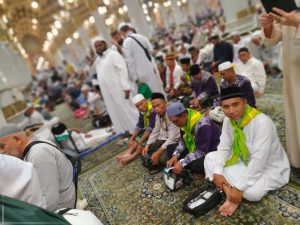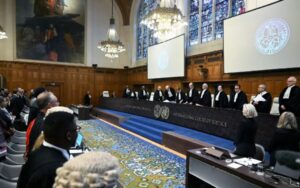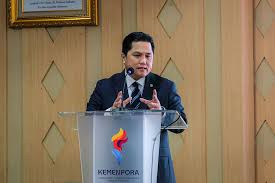by Ali Gomaa
It is the destiny of all world religions along history to be plagued with a group of fanatics who are blinded with their immature zealotry to advocate for their religion yet they lack all the necessary qualifications such as solid authentic knowledge, intellectual discernment, sound logic and refined manners which are keys to open up hearts and souls. Prophet Muhammad’s correspondents with world kings are true embodiment of the art of calling to Islam.
The message of Islam was universal by nature and was not confined to the borders of the Arabian Peninsula or restricted to Arabs. It was in fact a message encompassing the whole world as God says in the Quran, “Blessed is He who sent down the Criterion upon His Servant that he may be to the worlds a warner “ (25:1)
After the reconciliation of al Hudaybiyah, the Prophet sent letters and correspondents to the non Arab kings of neighboring countries with the Persian and Roman empires topping the list. The Prophet had sent a book carried by the messenger Dehia ibn Khalifa al Kalbi to Heraclius the Roman Emperor and the message reads,
The Almighty God Allah’s statement
“In the Name of God, Most Gracious, Most Merciful. From Muhammad ibn ‘Abdullah to Heraclius the Great one of Rome. Peace be upon him who follows the right path. Furthermore, I invite you to Islam and if you become a Muslim you will be safe, and Allah will double your reward, and if you reject this invitation of Islam you will be committing a sin by misguiding your subjects. And I recite to you God’s statement:
“O People of the Scriptures! Come to a word common to you and us that we worship none but God and that we associate nothing in worship with Him, and that none of us shall take others as Lords beside God. Then if they turn away, say: Bear witness that we are Muslims (those who have surrendered to God). (3:64).”
When Heraclius received the letter of the Prophet, he investigated about Islam through conversing with a convoy of Quraysh headed by Abu Sufyan. After Heraclius attentively listened to the description of the Prophet, he said “If he is truly as you describe him, he will own what my feet treads on and I knew that he was coming out but I didn’t think that he would be from among you. If I knew that I could meet him I would do what it takes to reach him and if I met him, I would wash his feet” (Bukhari 1/15)
The Prophet also sent a similar letter to al Muqawqas, the King of the Copts and it was carried by Hateb ibn Abi Balta’a. After a long conversation with the carrier of the message, al Muqawqas enveloped the letter into an ivory pocket and sealed it. He then called a writer who has a good command of the Arabic language and asked him to write what follows:
“In the Name of God, Most Gracious, Most Merciful. To Muhammad ibn ‘Abdullah from al Muqawqas, the Great one of the Copts. Peace be upon you…I have read your letter and understood what you mentioned in it and what you invite me to. I knew that there was a remaining prophet that should come out and I thought that he would come from the Levant area. I have honored your messenger and I have sent you two maids who enjoy a great position among the Copts along with a piece of cloth, and a mule to ride on…peace be upon you”. This was the response of al Muqawqas and he did not accept the invitation of Islam.
This indicates that both al Muqawqas and Heraclius were convinced of the message of Islam and the holy Quran yet they were hesitant in accepting and kind in replying.
Also Read: Egypt, Qatar Deliver Trump’s Gaza Ceasefire Proposal to Hamas
Reflection of the Prophet’s gentle approach
This lenient response from their side was a reflection of the Prophet’s gentle approach which suited their character and conformed to their thoughts and ideas.
This is proven through the Prophet’s letters to both kings in which he emphatically emphasized on the strong religious bond among divinely revealed religions as both kings were from the people of the book.
The Prophet was also meticulous in choosing his messengers as they were all characterized with utter decency, eloquence, etiquette and refined manners.
As for kings who did not belong to heavenly revealed books such as those who worshipped stones, trees, fire and stars, the Prophet in his letters emphasized on the necessity of humanity to return back to its divine origin and worship the One True God.
This was emphasized in the Prophet’s letter to Chosroes, the Emperor of the Persian Empire which reads “In the Name of God, Most Gracious, Most Merciful…From Muhammad the Messenger of God to Chosroes, the Great of Persia…peace be upon he who follows guidance and believed in God and his messenger and testified that there is no god worthy of worship but Allah, the One with no partners and that Muhammad is his slave and messenger.
I invite you with God’s invitation… I am the messenger of God to all people…if you become a Muslim, you will be safe and if you refuse, you will bear the sins of the Zoroastrians.
‘Abdullah ibn Huzafa al Sahmi was chosen to carry this letter and when it was read out loud to Chosroes, he tore it apart and responded inappropriately. When the Prophet heard about what he has done, he said “May God tear down his kingdom” and it was torn down as the Prophet said.
This arrogant response from Chosroes was totally different from the response of both al Muqawqas and Heraclius. Chosroes was conceited with his own capacious kingdom and bragged about his power and majesty which resulted from sitting on the great Persian throne.
Chosroes believed that he was immortal and his kingdom would last forever whereas the Prophet’s letter contained nothing but an invitation to Islam.
The message of reassurance
Through analyzing the Prophet’s letters to the non Arab kings we would realize that it was meticulously written decorated with eloquent wording. The prophet was gentle in his words as he was simply inviting not threatening.
He also addressed all the emperors and kings with their full titles and epithets which in fact indicates the Prophet’s recognition to their royal authority and renowned position among their subjects.
It also carries the message of reassurance that their royal positions are intact and their kingdoms will remain safe; this emphasis on keeping their majestic authority intact was crucially vital as the Prophet knew their love for power, hegemony and authority and also reassuring them that he was not after a worldly position.
The Prophet’s keenness to spread the message of Islam across the globe led him to converse and correspond with world kings in ways which fit the age he lived in and the circumstances which surrounded him.
The Prophet also managed to send gentle invitations to world kings without belittling the message of Islam but rather the Prophet acted in majesty mixed with leniency and strength mixed with mercy and gentleness. (T/P02/E1)
Also Read: Israeli Airstrikes Kill 54 Palestinians Across Gaza
Mi’raj News Agency (MINA)
Source: http://ali-gomaa.com/?page=scholary-output&so_details=199
Also Read: School Bus Explosion in Pakistan Kills Five, Military Accuses India




























 Mina Indonesia
Mina Indonesia Mina Arabic
Mina Arabic